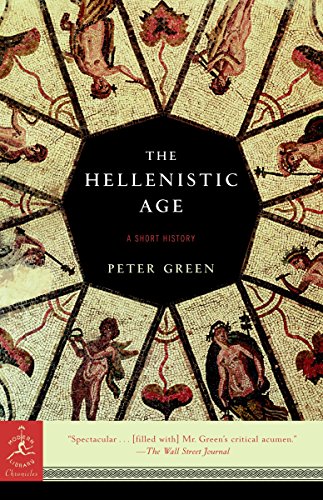All Categories


The Hellenistic Age: A Short History (Modern Library Chronicles)
Share Tweet
Get it between 2025-06-03 to 2025-06-10. Additional 3 business days for provincial shipping.
*Price and Stocks may change without prior notice
*Packaging of actual item may differ from photo shown
- Electrical items MAY be 110 volts.
- 7 Day Return Policy
- All products are genuine and original
- Cash On Delivery/Cash Upon Pickup Available








The Hellenistic Age: A Short History Features
-
Used Book in Good Condition
About The Hellenistic Age: A Short History
Product Description The Hellenistic Age chronicles the years 336 to 30 BCE, a period that witnessed the overlap of two of antiquity’s great civilizations, the Greek and the Roman. Peter Green’s remarkably far-ranging study covers the prevalent themes and events of those centuries: the Hellenization, by Alexander’s conquests, of an immense swath of the known world; the lengthy and chaotic partition of this empire by rival Macedonian bands; the decline of the city-state as the predominant political institution; and, finally, Rome’s moment of transition from republican to imperial rule. It is a story of war and power-politics, and of the developing fortunes of art, science, and statecraft, spun by an accomplished classicist with an uncanny knack for infusing life into the distant past, and applying fresh insights that make ancient history seem alarmingly relevant to our own times. “Spectacular . . . [filled with] Mr. Green’s critical acumen.” –The Wall Street Journal “Green draws upon a lifetime of scholarship to brilliantly sum up the three-hundred-year Hellenistic age. . . . Happily, this book’s brevity–admirable in itself, and in its concision, elegance, and authority–isn’t achieved at the expense of subtlety and complexity.” –The Atlantic Monthly “An interesting and well-written overview . . . Students of world history are in Green’s debt.” –The Philadelphia Inquirer “Marvelous . . . splendid . . . a brilliant introduction to this crucial transitional period.” –Publishers Weekly (starred review) About the Author Peter Green is the James R. Dougherty, Jr., Centennial Professor of Classics Emeritus at the University of Texas at Austin. He is the author of several books, including Alexander of Macedon and The Greco-Persian Wars. Currently he serves as adjunct professor of classics at the University of Iowa and editor of Syllecta Classica. Excerpt. © Reprinted by permission. All rights reserved. Chapter 1 Alexander and His Legacy (336 — 323) In October 336 BCE, a much-publicized royal wedding took place in the ancient Macedonian city of Aegae (modern Vergina): King Philip II’s daughter Cleopatra was marrying Alexander, king of the neighboring state of Epirus. The occasion was peculiar and ended tragically. The bridegroom, to begin with, was the bride’s uncle—in fact, the brother of Philip’s powerful but repudiated wife, Olympias, till recently an exile in Epirus, plotting revengeful mischief, but now back in Aegae as mother of the bride. Being on the eve of launching a major invasion of Asia Minor, then a Persian satrapy, Philip characteristically figured that an incestuous dynastic alliance would be a cheaper and easier way of protecting his rear than a time- consuming campaign. Hence the wedding. During the ceremony, the images of the twelve Olympian gods were accompanied, in procession, by one of Philip himself. Thus when, on the second day of the festivities, Philip was assassinated by a member of his own bodyguard as he entered the theater prior to the games, many regarded this as divine punishment for unseemly royal hubris. For others, clearly, it was an opportunity not to be missed. The assassin, Pausanias, was pursued and killed—thus precluding any interrogation of him—by friends of Philip’s son and (recently dispossessed) heir, the better-known, but not yet Great, Alexander. One of Philip’s most trusted senior nobles, Antipater, took immediate charge, quelled the chaos, presented young Alexander to the Macedonian army assembly, and had him confirmed as successor to the throne before his father’s body was cold. From being, at unlikely best, regent in Macedonia while Philip was winning glory on campaign, Alexander now found himself, at one stroke, both king and prospective leader of the long-planned Persian invasion. Regicide, as Elizabeth Carney reminds us, “was something of a Macedonian tradition.” Until the late fall of 338, the year of Philip’s great victory over the Greek states at Chaeronea, Alexander


















